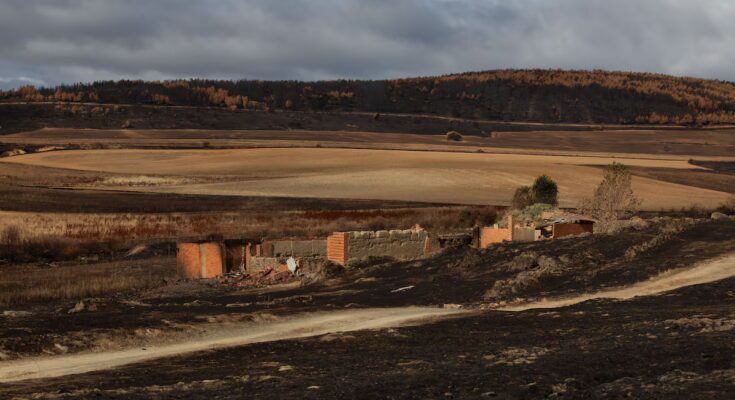The Municipality of Castrocalbón (León, 910 inhabitants) has reported to the Public Prosecutor’s Office the “imprudent actions” of the Junta de Castilla y León (PP) during the fires this summer, in particular the one that devastated this and other localities in southern León in August after starting from Molezuelas de la Carballeda (Zamora). The Consistory (PSOE with PP votes) makes use of the complaints of some forestry agents, regional employees, amazed by the management of the territorial Executive, and holds the Council responsible for the fact that two volunteers, integrated into the operation and executors of the command post’s orders, also died in that fire. The complaint, to which EL PAÍS had access, claims that these “imprudent actions” were fatal: “If they had not been committed, the very serious consequences of this fire would not have been such.” That fire is considered the largest in Spain’s history with around 32,000 hectares burned.
The Prosecutor’s Office has already received the technical report, composed of criticisms from public employees, which specifies the possible negligence committed by the Department of the Environment in its action in the face of the flames, which mainly punished Castrocalbón between 10 and 13 August and which took weeks to be put out throughout its large perimeter. The City Council, with the favorable vote of four socialist councilors and two of the PP, with one conservative against, claims that the environmentalists have expressed their willingness to testify before the Public Prosecutor if they are reported. These agents carried out actions considered incomprehensible, such as the fact that the forward command post (PMA) was located in an environment without cover and 14 kilometers from the most dangerous area, reducing its efficiency.
“During the entire morning of the 11th, I monitored the northern perimeter of the fire and tried to communicate with the WFP to send resources,” claims one of the workers in the complaint, a few hours after firefighters and neighbors tried to control the excessive northern front and asked in vain for more resources to cool or extinguish part of the burning source. There was almost no communication because the WFP was in a place with no line, although the situation was more serious on August 12 at midday, when the inhabitants managed to put out part of the fire with the help of a helicopter which had to stop to refuel.
The agents asked for a replacement so that “with two or three volleys” of water from the hill they could extinguish that flank but they did not intervene and soon suffered the reactivation which they were unable to reduce “between Felechares and Castrocalbón and south of Pinilla”, so powerful that the “tongue of fire” jumped the Eria river, devastated that environment and once it reached Quintana and Congosto it trapped the two volunteers. “There are no plans to send vehicles to that area”, replied the owners. An agent of the complainants warned: “You don’t know what you will prepare here today if you don’t send resources, you will make a big mess.” He understood well. The two burned men were in an area without cover and, despite requests, the WFP was still stationed in virtually isolated areas.
The two deceased were together and the first died and the second also died a few hours later. As admitted by the Minister of the Environment, Juan Carlos Suárez-Quiñones, the first deceased “is a person integrated into the operation, who had contributed resources to the operation for which the director of the fire brigade had assigned him a task”. The same with his companion, the other volunteer who was the victim of “two tongues of fire that came together in a surprising way and the fire captured them”. Castrocalbón reports that they have been asked for more resources on several occasions and that the existing ones have left because their workers far exceeded their working hours and no longer had to continue, even if they were not relieved.
Some media appeared, a fire truck but in half service: “It arrived without a plumber so some neighbors had to act as fire hoses” and in the vehicle “the radio station was not working” despite the driver having declared that he had asked for repairs some time ago. Not even requests to incorporate aerial vehicles and bulldozers to quell the advance of the fire were heeded. One of the agents points out that at a certain point, during the failed inspection, a technician arrived from León and tried to assign him the functions of fire extinguishing director due to his knowledge of the area, which did not correspond to him and even less so because he was on a day off despite his involvement with the city.
The complainants have incorporated several maps and images in which they mark with arrows the path of the flames, from south to north, complaining in the words of forestry officers that in several localities, as the neighbors have repeatedly stated, there were no members of the brigades to protect them: “From what I saw, at least in the towns of Pinilla, Pobladura, Felechares, San Félix and Calzada the fire entered without there being any means of extinguishing to defend them, apart from the neighbors who refused to be evacuated.” “It is inconceivable that fire engines were not sent to defend them,” which led to further devastation and a greater risk of volunteers being harmed, while fire directors were not even “very clear about where the front of the fire was.” The document sent to the Prosecutor’s Office adds another classic of these and other fires: “In more than 24 hours of work on the fire (at the command post) they did not provide supplies.”
“Many reckless actions have been committed that have led this fire to reach dimensions never seen before in the history of fires in Spain,” the 13-page document reads, specifying that many calls for help were ignored, that there was no way to move the PMA to make it more efficient and that firefighters had no food. Furthermore, they add that in Castrocalbón, as in many other surrounding towns, there has been extensive material damage to homes, livestock or cultivated land, agricultural warehouses or missing livestock, losses. Residents criticize the fact that the Council, in its aid plan, has foreseen 500 euros for all evicted people, which is difficult to verify reliably, 5,500 for each company or self-employed worker and variable amounts for breeders or farmers, which they consider scarce due to the long-lasting effects of the fires on territories such as these.



